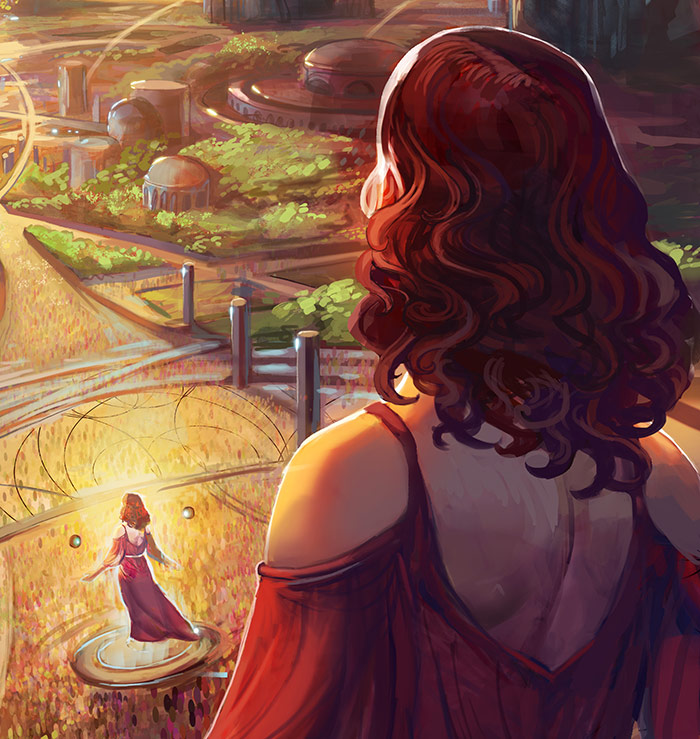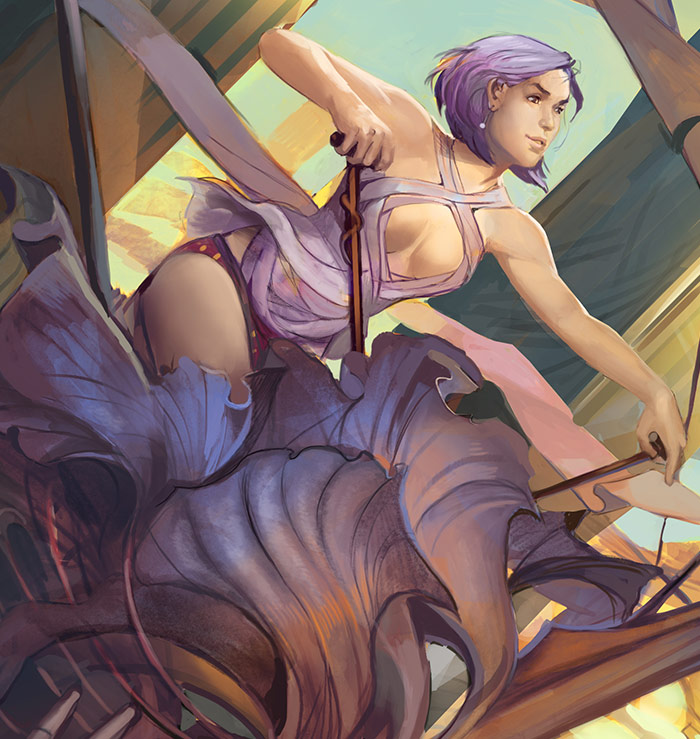If someone were to ask “what’s the most common question you get asked, as scifi erotica authors?” some obvious questions probably jump to mind. Like, for example, “Why worship AI gods through group sex?” or perhaps “What’s the wildest body modification a character makes in your series in order to get it on?” or even “That’s an awful lot of orgasming, isn’t it?”
“How do you co-author a book? What does the writing process look like?” are probably not the questions you would expect, and yet this is the most common type of questions we get asked. (Although the more sex-based worldbuilding questions do often display a remarkable intensity we can only admire.)
By this time you probably already know the origin story: Franklin wrote the first paragraph of the first draft of the first Passionate Pantheon book on Eunice’s naked back during an orgy, and yes, every word of that is true. It’s been a while since then, though, and that’s not what our system looks like any more. (Which is good, because writing with a fountain pen on naked skin is harder than you might think, and it makes edits and rewrites very difficult. Plus no one’s back is that vast, and no one’s handwriting is that small, that you can fit 120,000 words on a torso.) We haven’t even been in the same location for the majority of our co-writing, nor was travelling to see each other an option.
The first Passionate Pantheon book, The Brazen Altar, started with one character and one scene: the top of a ziggurat, an altar, a woman enduring nonstop forced orgasms from sunup to sundown. Hot, sure, but so many questions immediately spring to mind: Why? What is she doing there? What’s happening to her, and what purpose does this serve? Who is she?

Eunice, who (in)famously needs her sexual fantasies to have context and background in order to get horny, proceeded to create an entire world around this scene, which became the seed for the City.
The first draft of The Brazen Altar was written by Franklin. We would spend hours—occasionally eight or ten hours at a stretch, no exaggeration—talking about the world, the City, the people, the gods, the religions, the sex (of course), then Franklin would go away and write a few chapters. Then, once Eunice woke up (time zone differences are a real pain sometimes!), she would come back to rewrite, to add detail, and we’d have another long conversation. (At this point we were talking probably 15-30 hours per week.) And that’s how, several months later, The Brazen Altar was born.
Once the first draft was finished, Eunice did a deep read-through, making a number of changes. The book eventually went through five drafts betwixt the first version and the final printed copy that went out to readers.
Things changed a bit with the second book, Divine Burdens. Eunice wanted to take the ideas of the first book, which is a Utopian paradise (or as near as we can imagine according to our tastes, people being people), and keep the same setting but invert the themes: what if this post-scarcity society became erotic horror instead of erotic Utopia?
Divine Burdens was a struggle. That David Eddings quote, about writing feeling akin to birthing a baby elephant sometimes? Yeah, that was this book. It keeps most of the same structure of The Brazen Altar, but flips everything upside-down—you’ll find some stuff here that makes your skin crawl (in a sexy way of course), at least if we did our jobs right.
Divine Burdens required nine drafts, including a bit where we decided a large section of the book wasn’t really working, highlighted more than 40 pages of text, and hit Delete—no hesitation, just wham, gone.
The Gleaner story in particular was hard, because we knew the themes we wanted to explore but had trouble making the narrative structure work. We rewrote, and rewrote, and rewrote, before we finally got something we felt proud of. (There are a lot of minor side characters in the Gleaner story that had most of their backgrounds trimmed from the final; for example, we don’t know how many readers will catch the fact that the character Sirchia is something like a shy, introverted, charismatic sociopath.)
Once we’d established the world with The Brazen Altar and then inverted that world with Divine Burdens, we knew that we’d laid the foundations. Now we could have some fun with something rather more challenging. The Hallowed Covenant, due out in 2022, is narratively and structurally quite a shift from the first two, and is a lot more ambitious. It also required us to change how we worked, in order to accommodate that switching up of gears. Our old methods were functional, but we wanted something more like electrifying. We wanted you to feel our shared excitement as we wrote.
The Hallowed Covenant follows seven friends as they experience a series of life-changing adventures, set against the backdrop of the Festival of the Lady, a month-long celebration of arts and creativity that culminates in the ecstatic Dance of Sacrifice to the AI god of creative expression.

We worked together much more tightly with this book, and spent countless hours videoconferencing between London and Portland. In the fourth book, tentatively titled Unyielding Devotions, we explored an even more complex narrative structure still. It’s set in a dark city—a city of erotic horror that pushes the genre boundaries even further than our second book. We worked yet more closely again on the fourth, often editing simultaneously on the same document.
Since then, we’ve explored actually writing simultaneously, from a blank Google Docs file, both of us typing at the same time. This probably isn’t a common way to co-author—it’s far more common that coauthorship looks like what we did with The Brazen Altar and Divine Burdens—nor is it an easy one, and it requires tremendous trust in your partner. But we’ve found it incredibly satisfying.
A couple of months ago, someone asked Franklin if he’d be interested in live-streaming a writing session, “to help those of us who want to be writers see the process.” At first he thought this was a terrible idea. (Watching someone type? Sounds as exciting as watching paint dry!) Plus our style of co-writing probably isn’t that informative to most writers, who are much more solitary creatures, often living alone in their own imaginations for a significant proportion of their time.
But we’ve been thinking about it more, and actually, it might be kind of cool to live-stream the start of a new book. There’s a huge amount of world and character building behind the Passionate Pantheon series—we have more than 50 pages of notes that will never end up in any of the books! They’re never referenced on the page, and no one will ever explicitly talk about them except maybe during some small fragments on this blog and during discussions at book events. The conversations we have about setting and world and plot and philosophy would give folks a good peek at the weird and convoluted inside of our heads. (You, dear reader, see some small part of the final product in our blog posts right here, but what you can’t see is the conversations where we hash out these ideas.)
A live stream where viewers could see us talking and also watch the words appear on the screen might, we think, be kind of fun to do. Two sets of cursors, spinning a story as it goes from nothing situated only in our individual brains, to ideas spun back and forth between us, to words on a page, might be interesting. At the very least, it might give you a glimpse into the ridiculous depths of the things we consider before we write. A sentence in the final book might have originated in a three hour conversation on the background of a minor character, or a choice of architectural design, or the way that this character’s family was structured—and most people never get to hear that stuff.
So now we’re looking forward to when we will begin the as-yet-unnamed fifth book of the series, a book where we plan to do a deep dive into much more philosophical topics: family, birth, and death in the world of the Passionate Pantheon. This is an unusual opportunity (we normally jump into starting a new book right away—as Terry Pratchett wrote, the reward for finishing a book is that you get to start a new one), and it doesn’t come around often. We are considering sitting down at our computers, creating a brand-new document, and live-streaming the start of the book. What do you guys think? Is that something you might like to see?
The second Passionate Pantheon novel is now available on Indiegogo! Click here to get it before publication date at a reduced price!
